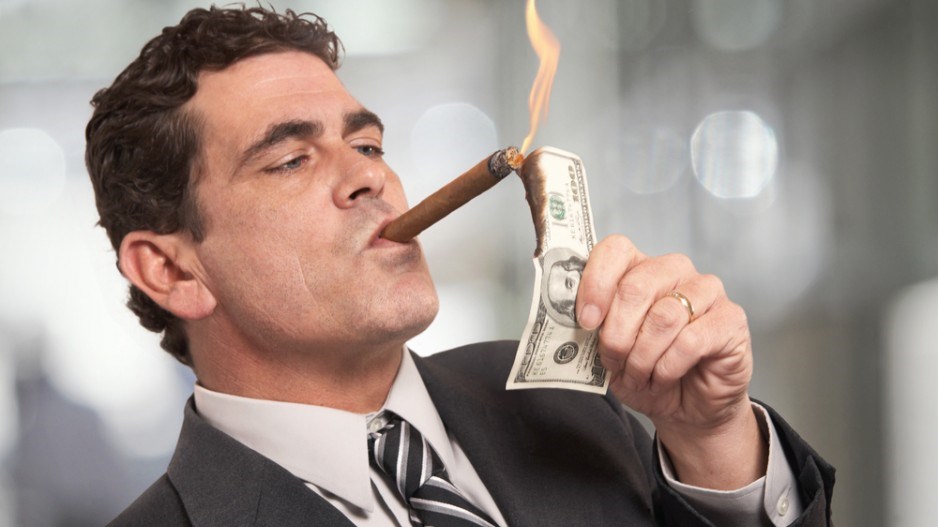A lot about money this week: who’s got too much, who’s not got much at all, who’s got a lot less now than at this time last year, who might have even less by the time you read this.
From the who’s-got-too-much file, consider the over-financed Fat Cat 62
According to Oxfam’s An Economy for the 1% report released January 18, the wealth of the poorest half of the world’s population has dropped 41% since 2010, while the wealth of the richest 62 people on Earth was up a half trillion or so to US$1.76 trillion over the same period. That gives the Fat Cat 62 as much wealth as all the members of the poorest half of the world combined. In addition to a cash surplus at the top, the Oxfam report says there’s a gender equality deficit: only nine of the Fat Cats are women.
Meanwhile back on Earth with the rest of the lumpenproletariat wage slaves
Short straws all round over the past week for Canada and its oil tanker economy, even with new skipper Justin Trudeau on the bridge. Torpedo attack via the newswire was pretty much relentless. Sample headlines, which included, “Canadian dollar hitting 30-year low” and “Oil prices plunge and stocks hit lowest level since 2014”, screamed over stories detailing energy stocks and companies being “pummeled,” crude prices plumbing new depths and the Canadian dollar suffering another caning in global money markets.
Not helping matters much at all was the imminent return of Iran to the oil market following the removal of international economic sanctions with the implementation of last July’s nuclear agreement. Reports had it set to cast away lines on 50 million barrels already loaded in tankers, eager to reap the windfall of an already saturated crude oil market and sub-US$30 per barrel prices.
Also removing any remaining oxygen from the oil price recovery ward: the International Energy Agency’s January Oil Market Report. Selections from the IEA’s bleak news menu: “persistent oversupply, bloated inventories and a slew of negative economic news pressured prices so that by mid-January crude oil touched 12-year lows” and “we conclude that the oil market faces the prospect of a third successive year when supply will exceed demand by 1.0 mb/d [million barrels per day] and there will be enormous strain on the ability of the oil system to absorb it efficiently.”
North to Alaska, because it’s not just Canada taking it on the chin
In Sarah Palin’s chilled-out state, the crude price drop has reduced Alaska’s industry tax cash flow to a trickle. As the OilPrice Intelligence Report (OPIR) detailed, the state has been among the hardest hit by the oil market dumpster fire because its severance (extraction) taxes are based on oil company net income not oil production. Alaska, reported OPIR, consequently received “practically no revenue from this tax” for 2015, and the state’s governor, Bill Walker, is now pushing to introduce the first income tax in four decades, “plus a cut in dividends to residents from the state’s oil fund.”
Ouch!
Other oil states’ government coffers also paid dearly in 2015: revenue in North Dakota and Texas was down 60% and 50%, respectively.
Bank of Canada to the rescue:
BoC governor Stephen Poloz underscored the bottom-line hit from oil’s slide earlier this month in his Life After Liftoff: Divergence and U.S. Monetary Policy Normalization, address: a $50 billion hit to the country’s bottom line. That’s around $1,500 off your bottom line.
As to Wednesday’s much-anticipated overnight rate action plan: inaction. Target left at 0.5%. Little wonder: No meaningful monetary policy chips left in the Poloz pile; Canada now awaits fiscal policy action plan from Trudeau, oil-tanker-helmsman-turned-marketplace-innovation-pitchman.
Next overnight rate target announcement: March 9.
But no rats abandoning this ship – yet
Too busy at the slots.
According to a University of British Columbia (UBC) press release, UBC scientists have discovered that sound and light cues added to a “rat motel” model turned the vermin into problem gamblers – or at least had them behaving like problem gamblers.
Could be some good news there for problem gambling and looming B.C. economic woes, viz: more strategically applied flashing lights and music could turn more investors and non-investors into gamblers in the marketplace. That could stimulate the economy. That could help the ailing dollar and slumping markets.
Failing that and Trudeau’s sales job at the World Economic Forum in Davos, Switzerland: somebody needs to track down a few email addresses or Twitter handles of the Fat Cat 62 to see if they’d be interested in some prime northern real estate, maybe a liquefied natural gas plant or two and/or other Canadian investment opportunities.
Otherwise, 2016 could be shaping up to be a Category 9 bad-hair year for Canadians from coast to coast to coast.




